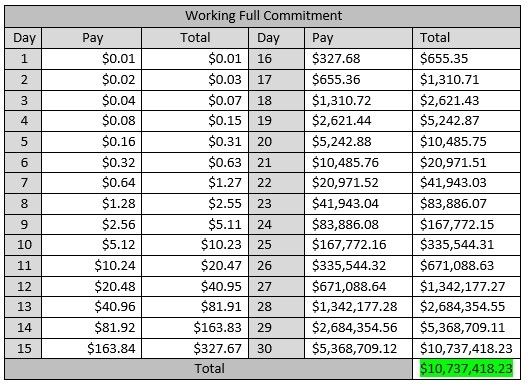That old example about doubling a penny for 30 days

This is a well known illustration of compound interest, with a twist.
Imagine taking a job for 30 days. You are given an opportunity to work with one, if not, the richest person in the world. There is a catch. You must commit to 30 days. Promises of great riches are assured. Here is the deal. Once you start, you cannot quit. If you do, you lose everything. Each day ends with payment in cash. To prove yourself, you agree to start at a very low pay. Pay starts a 1 cent for the first day and is doubled for each day after. Dedication and commitment are required, so if you skip a day, the pay starts again at $0.01 the next day you return to work.
 Let’s work out the math: Day one=0.01, Day two=0.02, Day three=0.04, Day four=0.08, Day five=0.16, Day five=0.32 Day six=0.64, and Day seven=1.28 So, after the first week you will have $2.55 Quite the accomplishment, eh? (Is this job really worth doing?) Your mentor assures you the lessons you will learn are worth more than the money, but the money is possible too, if you stick to it.
Let’s work out the math: Day one=0.01, Day two=0.02, Day three=0.04, Day four=0.08, Day five=0.16, Day five=0.32 Day six=0.64, and Day seven=1.28 So, after the first week you will have $2.55 Quite the accomplishment, eh? (Is this job really worth doing?) Your mentor assures you the lessons you will learn are worth more than the money, but the money is possible too, if you stick to it.
This is a story of gratitude, delayed gratification, and commitment (persistence). Let us reiterate the deal; if you sign the contract, you must work a minimum of 30 days. (If you take a day off, that is okay, you just need to add a day to make a total of 30 days worked, and when you take a day off, you are not paid on that day, AND the pay resets to one cent the following day.) Cash is paid daily. If you don’t complete the 30 days, you must return all money. Okay, let’s do this opportunity of a lifetime.
First, let’s say you are religious and must take the seventh day of the week off, each and every week. No problem, but your entire work stint will take 34 days. Here is what that looks like:

Well now, this doesn’t seem like such a deal. At the end of the 30 days of work (34 days later, since you took four days off) you have a grand total of $3.15. The reason this is so low is that reset to 1 cent after your day off. Of course, you also don’t get paid on your day off. Starting over again every week really doesn’t work.
So, let’s say you can waive your religious commitment for one month, but you do need to take one day off in the middle. No problem; just add a day to the end of the month to compensate. Let’s take a look at the numbers now.

Well now, taking the one day off in the middle of the month wasn’t so bad, and you get significantly more money by only taking one day off. Now you have $819.18 compared to $3.15 for the same amount of work. Not the best pay, but way better than resetting every week. (260 times the amount!)
But, what if you could delay that day off another week? You can slip your schedule a bit and move it further away. Instead of the 15th day, you take the 21st day off. What would that look like? Let’s take a look:

Holy guacamole! Now you would have $10,495.98 instead of $819.18 (compared to $3.15) for the same amount of work. That’s more than 12 times as much just by waiting another week before your day off. (3,332 times more than taking a day every week.) Hmmmm, it seems working hard longer does pay off. Now we are at a level that makes sense to make such a commitment. Commitment and perseverance pays off. Excellent.
But wait, there is MORE!
In truth, the contract is for 30 contiguous days. Let’s look and see what would happen if you worked the straight 30 days with no day off. Here is what that looks like:

There, my friend, is the MIRACLE of COMPOUND INTEREST! Commitment and perseverance pay off. Longevity is a factor too. Your 30-day adventure of focused work pays out a whopping $10,737,418.32!
Here we see the reason for committing and sticking. Work the plan, trust the process.
Those numbers are mind boggling. The longer you can go without a reset, the better.
Leave a Reply
You must be logged in to post a comment.